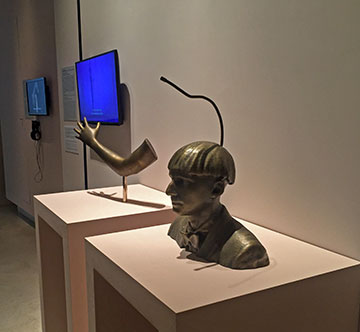Cyborgs among us
Cyborgs are not robots and robots are not cyborgs. Please don't confuse the two on an exam! A cyborg may be defined as a "human being or other animal that has certain physiological processes aided, replaced, or controlled by mechanical or electronic devices." The term is short for cybernetic organism. Cybernetics is "the science of communication and control theory that is concerned especially with the comparative study of automatic control systems (as the nervous system and brain and mechanical-electrical communication systems)" (source: Merriam-Webster's extension of your professor's mind).

Bust of Neil Harbisson (see below) in the Human+ exhibition I saw at the Palazzo delle Esposizioni, Rome in 2018
Both of these definitions stress the idea of control, and this is one of the things that frightens many people contemplating a cyborg future for humanity. We don't want to become machines that can be controlled; we want to control the machines. We may be fine with prosthetic limbs or even 3D-printed ears, but when we hear that a machine would interface directly with our brain or our nervous system, most people become anxious. The majority of us still want to think of minds, at least, as our own (our own meat, or perhaps something completely immaterial).
If we are implanted with electronic circuits and hooked into networks we may have wonderfully extended minds and we may be able to control enhanced body parts or even robotic extensions that are not physically attached to us. We might be able to drive a vehicle with our minds, for instance, or control an extended body in the kitchen making dinner while our meat body relaxes in an easy chair listening to music. We may even pilot a sex robot that is "making love" to our own meat body - or why not a couple of sex robots, as long as we're at it? But will we also be vulnerable to being controlled ourselves by those who control the technology? Or by hackers, and so forth?
Some of the experimentation with cyborg animals that has been going on does seem to fuel this anxiety many of us feel about the control aspect of electronic implants. Search for "remote-controlled beetle" (or rat or mouse) on YouTube and you will find clips of some intriguing but disturbing footage. For instance, there are cockroaches whose brains have been hacked with remote-controlled robotics. The idea is that these small, tough creatures can be guided through the sites of natural disasters with cameras so that we can search for survivors in places humans themselves couldn't get into. On the other hand, robotic insects have also been of great interest to military intelligence, because insects could penetrate comparatively unnoticed behind enemy lines. The uses by intelligence agencies are myriad, certainly for surveillance, but possibly also with more deadly payloads.
These early experiments are a little frightening if you identify as an animal, as I do. Will we get hacked by human power-mongers or evil AIs and become their unresisting servants? Maybe we will be sent to our deaths for their interests; maybe we will simply be turned into unpaid labour like so many cockroaches; maybe we will be the ideal sex robots. The popular imagination has tended to conceive of cyborgs negatively, as puppets of inhuman puppet masters or as grotesque quasi-human beings whose humanity has been destroyed by their merging with the machines, evil enemies of old school humankind.
But the truth is: the cyborgs are already among us. And they may not be what you think. Here's one of the best-known:
And here's one of the world authorities on cyborgs (some say a cyborg himself) - Kevin Warwick:
The most interesting thing to me about what Warwick has to say is the part where he talks about the unprecedented intimacy he felt with his wife when he was able to feel exactly and simultaneously what her arm felt via technology. This to me suggests the positive, empathic potential of technology, as already hinted at in the lesson on sex and love. Perhaps instead of becoming monsters, future humans whose minds and bodies have been artificially extended through technology will find that their emotional humanity too has been extended.